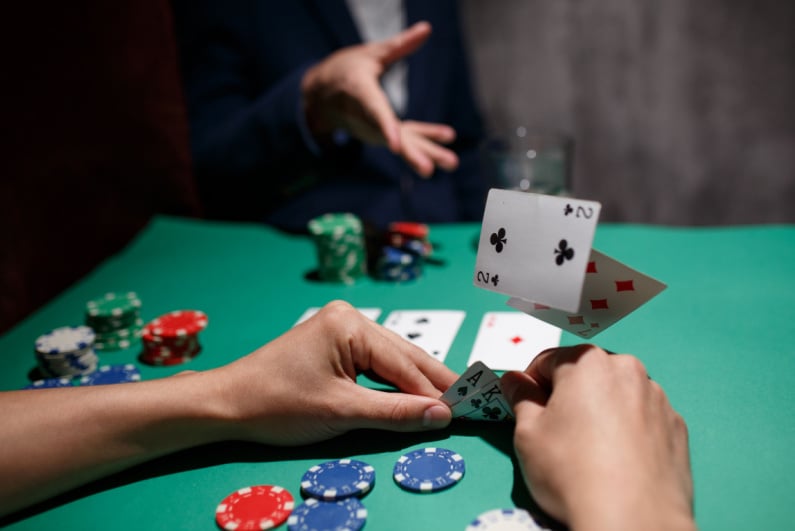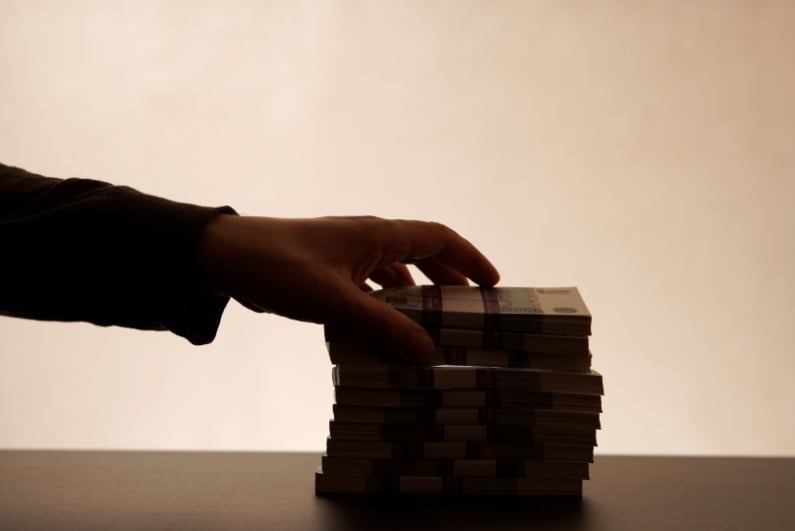This year’s howler
I have max late regged one of the lower buy-in WSOP events on my second bullet. A good start sees me run it up quickly to almost four times the starting stack when a new player with heaps arrives at the table. He looks like an action player and it doesn’t take long to confirm that initial read as he maintains a VPIP of close to 100%.
After a UTG open from an older player and a flat call just behind, he, too, calls in the hijack. I look down at 9c-9s on the button and elect to call too, and we go four-way to the flop, which comes Td-5h-4c.
he shouldn’t be bluffing much or betting anything worse than my hand
The opener checks, as does the first caller, and the action player now fires out a 40% pot bet. He’s betting into three other players so he shouldn’t be bluffing much or betting anything worse than my hand, but he’s also who he is, so I thought I had a fairly trivial call here with what will very often be the best hand. If one of the other two more straightforward players shows an interest in the pot, I’ll happily reassess that view and pitch my hand, but they both fold so I go to the turn reasonably content with my lot.
The turn was Qh.
I quickly decided this was a fairly neutral card. My opponent can have QT specifically, or maybe sometimes QJs with a backdoor flush draw he decided to get adventurous with on the flop, but apart from that, not many of his hands improve.
My opponent thinks for quite some time and rearranges some chips like he is going to bet before checking. In my experience, that behavior quite often indicates a desire to see the river for free with a marginal hand or draw, so once the relief of not facing a tricky decision if he had fired a second barrel has subsided, I weigh the relative merits of betting and checking. The main merit of betting is to deny equity to weaker hands and the main merit of checking is definitely getting to see the river against an opponent who has already shown a tendency to overbluff and would most likely be more willing to put money in with a weaker one pair hand on the river after I checked the turn. In the end, I decide checking was the play.
The river was 2c.
I didn’t think my opponent was that sophisticated
My opponent now bets about 80% of the pot. I stare at the board trying to think what he could have. A sophisticated player might choose this sizing with a bare Ten, recognizing most of my range is hands like the one I have after the turn checks through. I didn’t think my opponent was that sophisticated, though. I also found it hard to give him a Queen, as I was pretty sure he’d have bet that on the turn. That left busted draws, weaker pairs he was randomly bluffing with trying to get me off the type of hand I have, and maybe some sets (most likely a rivered one). I took a long time and studied him carefully, getting no strong read of strength or weakness, before I threw in the call.
Oh, muck my life
In situations like this where you tank call the river, you usually know almost instantly before you see your opponent’s hand whether you win or not, because one of two things happens: either your opponent confidently tables his hand knowing it to be the winner against your tank call range, or he sheepishly turns over the bluff.
On this occasion, my opponent flipped over his hand with all the confidence of the nuts and my hopes I’d made a good hero call dissipated. Glancing at the top card I saw a four with what appeared to be another four beneath it, and thinking I’d lost to a set of fours, I pushed my cards forward towards the muck rather than turning them over. But as I looked more carefully at my opponent’s hand doubt crept into my mind. The card mostly obscured by the card on top was not a four, but a seven. My opponent was holding 74 offsuit so my nines were good.
Those cards are in the muck! Your hand is dead!”
As I reached forward to turn over my cards, which were roughly halfway between me and the muck, my opponent yelled: “Those cards are in the muck! Your hand is dead!”
By now my hand was on my cards, but rather than turn them over I lifted my hand in a “what the hell do you mean?” gesture to back up the verbal statement: “What do you mean? My cards haven’t touched the muck!”
Ignoring me completely, my opponent instead turned his attention to the dealer, saying: “Put those cards in the muck! His hand is dead.”
Before I had time to react the dealer had whipped my cards from under my hand into the muck and was pushing the pot to my gleeful opponent.
Remembering the ruling from two years ago where my opponent’s hand was retrieved from the muck because he could identify the cards and suits exactly, I immediately called floor, knowing I’d be able to identify my cards as black nines. My heart sunk a little as I saw who the floor person approaching was, a gentleman called Nate who has not impressed me as one of the many fine floor staff at the WSOP (if I’m honest he’s one of the worst I’ve ever seen anywhere, in terms of table side manner and consistency of rulings).
He barely paused from his fast walk to listen to what had happened before delivering an instant ruling that cards in the muck were clearly dead. Before I had time to protest that this was inconsistent with the previous ruling and I could identify my cards with suits, he was gone.
Lessons learned
The first lesson I learned from this mishap is always table your cards. Misreads and mistakes will happen, but the surest way not to muck the winning hand is to always table your cards.
inconsistent rulings are sadly commonplace at the WSOP
The second lesson is a subtler one, which Andy Black was the first to point out. Andy told me bad and inconsistent rulings are sadly commonplace at the WSOP, and if you get what you believe is a bad one, escalate to the next level of floor staff, all the way to Jack Effel if necessary. This is something which simply didn’t occur to me in the moment, but should have after the experience of a friend last year.
She got a lot of stick in the PokerNews blog after creating a scene after what she believed to be a bad ruling. The cameras revealed her to be correct some time later and the ruling was reversed, and as one of her backers in the event I was impressed by her willingness to fight her corner to protect the equity of her backers even at the cost of some personal embarrassment. My one consolation from my own failure to do this was that it was all my own equity, as it wasn’t an event I had sold for. But to both myself and anyone reading this I would say if you ever do get what you believe to be a bad or inconsistent ruling, don’t be afraid to kick up one hell of a fuss.




